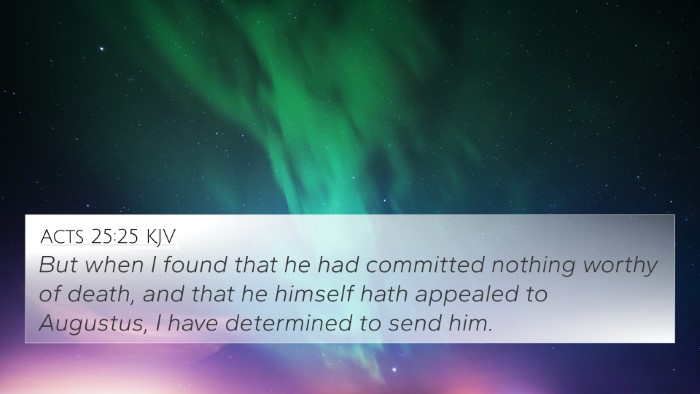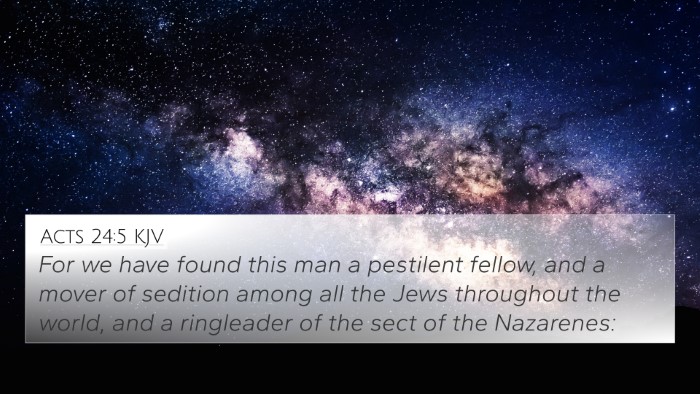Meaning and Explanation of Acts 23:29
Acts 23:29 speaks to the careful examination of Paul’s case, highlighting the importance of a just and fair process even in the midst of conflict. The verse states:
"And I found out that he was accused of questions of their law, but to have nothing laid to his charge worthy of death or of bonds."
This portion of scripture illustrates the significance of legal integrity and ethical judgment among governing authorities. Below are summarized insights gathered from various public domain commentaries, including those from Matthew Henry, Albert Barnes, and Adam Clarke.
Summary of Commentary Insights
The key takeaway from Acts 23:29 is the affirmation of proper legal procedure in the examination of Paul’s accusations. It emphasizes the role of the Roman authorities in ensuring justice.
- Matthew Henry's Commentary:
Henry emphasizes that Paul’s accusers failed to provide substantial evidence against him, reflecting the unjust nature of the accusations based on theological disputes rather than actual crimes. He indicates that the Roman official recognized the lack of merit in the charges, thereby demonstrating the need for meticulous examination of accusations before any condemnation.
- Albert Barnes' Notes:
Barnes notes that the reference to “questions of their law” underlines the distinct difference between Roman law and Jewish law. He points out that the accusations were rooted in religious issues, indicating that the Roman authorities were not equipped to adjudicate such matters.
- Adam Clarke's Commentary:
Clarke reflects on the implications of Paul's situation, stressing the importance of fairness and justice. He highlights that Paul’s circumstance illustrates the broader principle that one should not be condemned based solely on unsubstantiated claims, a principle that can apply across various sensitive legal and moral contexts.
Cross-References for Acts 23:29
Acts 23:29 stands in connection with several other verses that further reflect upon themes of justice, legality, and the treatment of individuals within the legal framework:
- John 7:51 - "Doth our law judge any man, before it hear him, and know what he doeth?" – This verse aligns with the concept of due process echoed in Acts 23:29.
- Luke 23:14-15 - "And said unto them, Ye have brought this man unto me, as one that perverteth the people: and behold, I, having examined him before you, have found no fault in this man." - Reflects a similar judgment process regarding accusations against Jesus.
- Romans 13:3-4 - "For rulers are not a terror to good works, but to the evil." – This emphasizes the role of authorities to uphold justice, linking back to the officials’ role in Paul’s trial.
- Acts 24:13 - "Neither can they prove the things whereof they now accuse me." – Paul continues to assert his innocence highlighting the inconsistency in accusations.
- Matthew 5:25 - "Agree with thine adversary quickly, whiles thou art in the way with him." – Suggests the need for reconciliation and fair dealing in legal matters.
- 1 Peter 3:16 - "Having a good conscience; that, whereas they speak evil of you, as of evildoers, they may be ashamed that falsely accuse your good conversation in Christ." – Aligns with Paul’s good conduct amidst false accusations.
- Proverbs 18:17 - "He that is first in his own cause seemeth just; but his neighbour cometh and searcheth him." – Highlights the importance of looking at all evidence carefully before drawing conclusions.
Thematic Connections and Applications
The themes of justice, ethical conduct, and the examination of accusations resonate through various parts of scripture, illustrating the consistent biblical principles regarding how individuals should be treated under the law:
- Integrating Justice in Governance: Acts 23:29 illustrates the expectation that authorities should exercise fairness in legal matters, resonating with many proverbs about justice.
- Morality in Legal Proceedings: The teachings throughout the scripture prompt believers to advocate for integrity and righteousness in all dealings, especially in judicial contexts.
- Religious vs. Secular Law: The dichotomy between Jewish and Roman law in this context illustrates the ongoing dialogues regarding the interplay between faith and societal laws.
Tools for Bible Cross-Referencing
For further study and understanding of the connections between Bible verses and the principles depicted in Acts 23:29, here are some tools and methods to aid in cross-referencing:
- Bible Concordance: A comprehensive tool that lists words or phrases for finding cross-references across various books of the Bible.
- Cross-reference Bible Study: Employing a methodical approach that ties related scriptures for deeper understanding.
- Scriptural Linkage Tools: Resources that allow readers to explore thematic links and parallels within scripture.
- Comparative Bible Verse Analysis: Analyzing how different scriptures relate on similar themes can illuminate understanding.
- Bible Chain References: Utilizing references that connect one verse to another in a flowing manner contributes to an enriched study experience.












